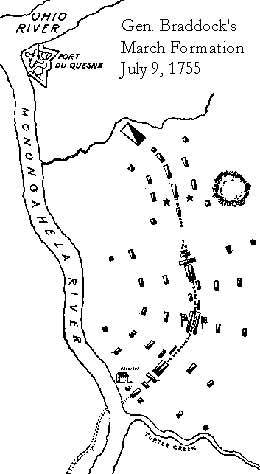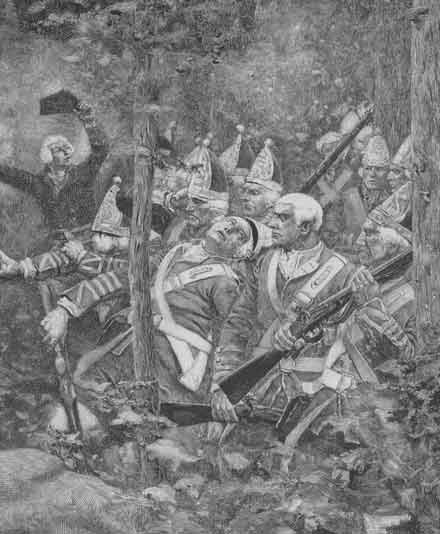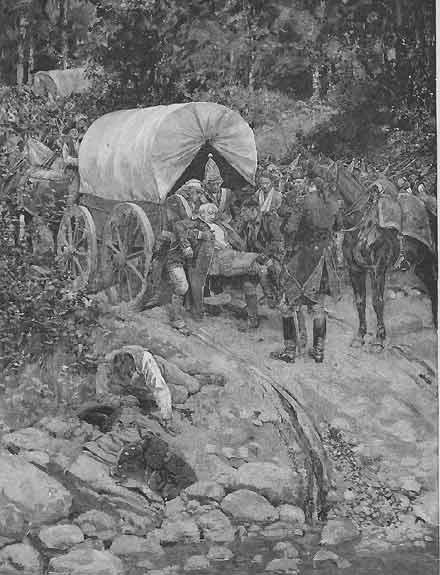|
________________________________________________________________________________
The
Fort Edwards Archiveon theWeb
Reprinting Articles from Old Publications
_________________________________________________________________________________
Battle of Fort Necessity & Braddock's Defeat
From the Manuscript of George Washington
Continued (Section II)

Departure from Fort Cumberland
About the middle of June this armament, consisting of the two Regiments from Ireland, some independent companies and the provincial troops of Virginia, Maryland and North Carolina, began to move from Fort Cumberland, whither they had assembled.  After several days' march, and difficulties to which they had never been accustomed in regular service in Campaign Countries, and of which they seemed to have had very little idea, the Genl. resolved to divide his force, and at the head of the first division which was composed of the flower of his army, to advance, and leave Col. Dunbar with the second division and the heavy baggage and stores, to follow after. By so doing, the first division approached the Monongahela 10 miles short of Fort Duquesne the 8th of July, at which time and place having so far recovered from a severe fever and delerium from which he had been rescued by James' powder, administered by the positive order of the Genl. as to travel in a covered Waggon, he joined him and the'next day tho' much reduced and very weak mounted his horse on cushions, and attended as one of his Aids. After several days' march, and difficulties to which they had never been accustomed in regular service in Campaign Countries, and of which they seemed to have had very little idea, the Genl. resolved to divide his force, and at the head of the first division which was composed of the flower of his army, to advance, and leave Col. Dunbar with the second division and the heavy baggage and stores, to follow after. By so doing, the first division approached the Monongahela 10 miles short of Fort Duquesne the 8th of July, at which time and place having so far recovered from a severe fever and delerium from which he had been rescued by James' powder, administered by the positive order of the Genl. as to travel in a covered Waggon, he joined him and the'next day tho' much reduced and very weak mounted his horse on cushions, and attended as one of his Aids.
The Battle Begins
About 10 o'clock on the 9th, after the van had crossed the Monongahela the second time, to avoid an ugly defile (the season being very dry and waters low) and the rear yet in the river the front was attacked; and by the unusual hallooing and whooping of the enemy, whom they could not see, were so disconcerted and confused as soon to fall into irretrievable disorder. The rear was forced forward to support them, but seeing no enemy, and themselves falling every moment from the fire, a general panic took place among the troops, from which no exertions of the officers could recover them. In the early part of the action some of the Irregulars (as they were called) without directions advanced to the right in loose order, to attack;  but this, unhappily from the unusual appearance of the movement being mistaken for cowardace and a running away, was discountenanced? and before it was too late, and the confusion became general, an offer was made by G. W. to head the Provincials and engage the enemy in their own way; but the propriety of it was not seen into until it was too late for execution. but this, unhappily from the unusual appearance of the movement being mistaken for cowardace and a running away, was discountenanced? and before it was too late, and the confusion became general, an offer was made by G. W. to head the Provincials and engage the enemy in their own way; but the propriety of it was not seen into until it was too late for execution.
After this, many attempts were made to dislodge the enemy from an eminence on the right, but they all proved ineffectual, and fatal to the officers, who by great exertions and good examples endeavored to accomplish it. In one of these the Genl. received the wound of which he died; but previous to it, had several horses killed and disabled under him. Captns. Orme and Morris (his two Aides de camp having received wounds which rendered them unable to attend, G. W. remained the sole Aide through the day, to the Genl.; he also had one horse killed and two wounded under him, a ball through his hat, and several through his clothes, but escaped unhurt. Sir Peter Halkel (secd. in command) being early killed, Lieut. Colo. Burton and Sir John St. Clair (who had the rank of Lt. Colo. in the army) being badly wounded, Lieut. Colo. Gage (afterwards Gen. Gage) having received a contussion.
The Retreat Begins
No person knowing in the disordered state things were who the surviving senior officer was, and the troops by degrees going off in confusion ; without a ray of hope left of further opposition from those that remained, G. W. placed the Genl. in a small covered Cart, which carried some of his most essential equipage, and in the best order he could, with the last troops (who only continued to be fired at) brought him over the first ford of the Monongahela; where they were formed in the best order circumstances would admit on a piece of rising ground; After wch. by the Genl.'s order, he rode forward to halt those which had been earlier in the retreat. Accordingly, after crossing the Monongahela the second time and ascending the heights, he found Lieut. Colo. Gage engaged in this business, to whom he delivered the Genl.'s order and then returned to report the situation he found them in.
When he was again requested by the Genl. whom he met coming on in his litter with the first halted troops, to proceed (it then being after sundown) to the second division under the command of Colo. Dunbar, to make arrangements for covering the retreat, and forwarding on provisions and refreshments to the retreating and wounded soldiers. To accomplish this, for the second division was 40 odd miles in the rear, it took up the whole night and part of the next morning which from the weak state in which he was, and the fatigues, and anxiety of the last 24 hours, rendered him in a manner wholly unfit for the execution of the duty he was sent upon when he arrived at Dunbar's camp. To the best of his power however, he discharged it, and remained with the second division till the other joined it. The shocking scenes which presented themselves in this night's march are not to be described ? the dead ? the dying ? the groans - lamentations and crys along the road of the wounded for help (for those under the latter descriptions endeavored from the first commencement of the action or rather confusion to escape to ye second division) were enough to pierce a heart of adamant.
The gloom and horror of which was not a little encreased by the impervious darkness occasioned by the close shade of thick woods which in places rendered it impossible for the two guides which attended to know when they were in or out of the track, but by groping on the ground with their hands. Happy was it for him and the remains of the first division that they left such a quantity of valuable and enticing baggage on the field as to occasion a scramble and contention in the seizure and distribution of it among the enemy; for had a pursuit taken place, by passing the defile which we had avoided, and they had got into our rear, the whole, except a few woodsmen would have fallen victims to the merciless savages. Of about 12 or 13 hundred which were in this action, eight or 9 hundred were either killed or wounded, among whom a large proportion of brave and valuable officers were included. The folly and consequence of opposing compact bodies to the sparse manner of Indian fighting in woods, which had in a manner been predicted, was now so clearly verified that from henceforward another mode obtained in all future operations.
Death of Gen. Braddock
As soon as the two divisions united, the whole retreated towards Fort Cumberland,  and at an incampment near the Great Meadows the brave but unfortunate Genl. Braddock breathed his last. He was interred with the honors of war, and as it was left to G. W. to see this performed, and to mark out the spot for the reception of his remains to guard against a savage triumph, if the place should be discovered they were deposited in the Road over which the army wagons &c. passed to hide every trace by which the entombment could be discovered. and at an incampment near the Great Meadows the brave but unfortunate Genl. Braddock breathed his last. He was interred with the honors of war, and as it was left to G. W. to see this performed, and to mark out the spot for the reception of his remains to guard against a savage triumph, if the place should be discovered they were deposited in the Road over which the army wagons &c. passed to hide every trace by which the entombment could be discovered.
Thus died a man whose good and bad qualities were intimately blended. He was brave even to a fault and in regular service would have done honor to his profession. His attachments were warm ? his enmities were strong ? and having no disguise about him, both appeared in full force. He was generous and disinterested ? but plain and blunt in his manner even to rudeness. After this event the troops continued their march forward and soon arrived at Fort Cumberland without molestation, all except the pvls. immediately resolved to proceed to Philadelphia; by which means the frontiers of that state but more especially those of Virginia and Maryland, were laid entirely open by the very avenue which had been prepared.


|